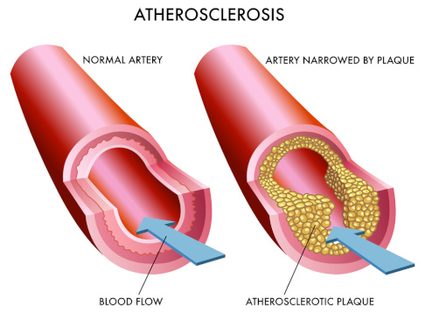Arterial Age Calculator
Our arterial age calculator will translate your Agatston score into a more understandable parameter - the age of your arteries. We based our calculator on the Mesa (Multi-Ethnics Study of Atherosclerosis) study that investigates the problem of atherosclerosis in asymptomatic patients. Read on to learn more about your calcium score, what is average artery blockage by age, and more!
We try our best to make our Omni Calculators as precise and reliable as possible. However, this tool can never replace a professional doctor's assessment. If any health condition bothers you, consult a physician.
Agatston calcium score, arterial age, and risk of heart disease
So your doctor has sent you to the calcium score test. You've been to the big noisy machine and got a result - some numbers. Wondering what exactly happened?
The test you've had, sometimes called an arterial age test, was an imaging of your heart, mainly its arteries. The arteries are the blood vessels that run the blood into the organs to keep them nourished, oxygenated, and alive. A sudden blockage in the artery that cuts down the blood flow will result in tissue or organ death. That happens during myocardial infarction, or brain stroke.
But long before a clog happens, the artery narrows down over the years. The process is caused by atherosclerosis — building up the deposits made of fat, cholesterol, calcium, and fibrous tissue.

Indeed, we all have some atherosclerosis plaques sitting in our arteries. Why do they appear? It's a process primarily dependent on our age and lifestyle. Some say atherosclerosis is an indicator of aging of our vessels, just as wrinkles mark the aging of our skin. But some factors affect the process and can speed it up or slow it down.
Things that contribute to faster building up of the plaque (it's just a tiny part of the list!):
- Male gender;
- Poor diet - lots of meat, processed foods, saturated fats, lack of vegetables and whole grains;
- Smoking;
- Sedentary lifestyle;
- High level of cholesterol;
- Hypertension; and
- Diabetes.
Estimating the content of calcium and plaque in your arteries, e.g., by calcium score, helps determine your individual risk of heart disease. It reveals in black and white if plaque restricts the blood flow in your vessels. The higher the calcium score, the higher your risk of myocardial infarction or stroke.
How to use the arterial age calculator?
To use our arterial age calculator, you need to:
- Input your calcium score. The only way to obtain it is to undergo a special imaging examination — computerized tomography.
- Don't enter the CIMT — carotid intima-media thickness (sometimes called arterial age test) — results. This will give you inaccurate results.
- Enter your actual age.
- That's it — your results are ready.
Now you know the difference between your and your arteries' age!
Arterial age calculator practical use
The number that you got from your arterial age test might seem unclear. That's why we try to translate it into a more friendly value, such as estimated arterial age. The arterial age is much more intuitive and tells you if your actions are right and worth repeating - when your arteries seem younger than you are, or the contrary.
Some researchers suggest that counting the 10-year cardiovascular disease risk with your arterial age instead of your actual age might provide more accurate results.
Let's solve an example.
👩 Janice is 64 years old, and her physician ordered an Agatston score test. Her calcium score is only 23. That means that her arteries are approximately 62 years old. This means how she takes care of her health is good and works in her favor.
Average artery blockage by age
There is no one fixed value of stenosis corresponding to age. However, we do have studies showing how prevalent blockage is in particular age groups. Let's look at one of the biggest meta-analyses exploring the topic in asymptomatic participants.
Prevalence (%) of ACAS in the age groups | |||
|---|---|---|---|
Age (years) | moderate (≥50%) ACAS | severe (⩾70%) ACAS | |
<50 | men | 0.2 | 0.1 |
women | 0.0 | 0.0 | |
50-59 | men | 0.7 | 0.2 |
women | 0.5 | 0.1 | |
60-69 | men | 2.3 | 0.8 |
women | 2.0 | 0.2 | |
70-79 | men | 6.0 | 2.1 |
women | 3.6 | 1.0 | |
≥80 | men | 7.5 | 3.1 |
women | 5.0 | 0.9 | |
At what age do arteries start to clog?
Scientists can detect the first signs of atherosclerosis in children as young as 10-14. The process speeds up in your twenties. However, most people will not show any signs of atherosclerosis until they reach 40-50.
What is the arterial age with a calcium score of 190?
The estimated arterial age of a person with a calcium score of 190 is 77 years.
To calculate it on your own, you need to use an equation:
AA = 39.1 + 7.25 × log(CS+1)
where:
AA — arterial age; and
CS — calcium score (Agatston score).
How do I anti-age my arteries?
To keep your vessels young and healthy:
- Quit smoking;
- Keep your total and LDL cholesterol low and HDL cholesterol high;
- Stay within the normal BMI;
- Eat plenty of vegetables, whole grains, pulses, and healthy fats;
- Practice sport, move a lot; and
- Take care of your sleep and stress management.
How do I get a calcium score?
A calcium score is measured during an image examination called computerized tomography (CT) of the heart. The imaging can reveal calcium deposits in the heart's arteries. The deposits can narrow down the blood flow through the heart and cause a heart attack in case of rupture.